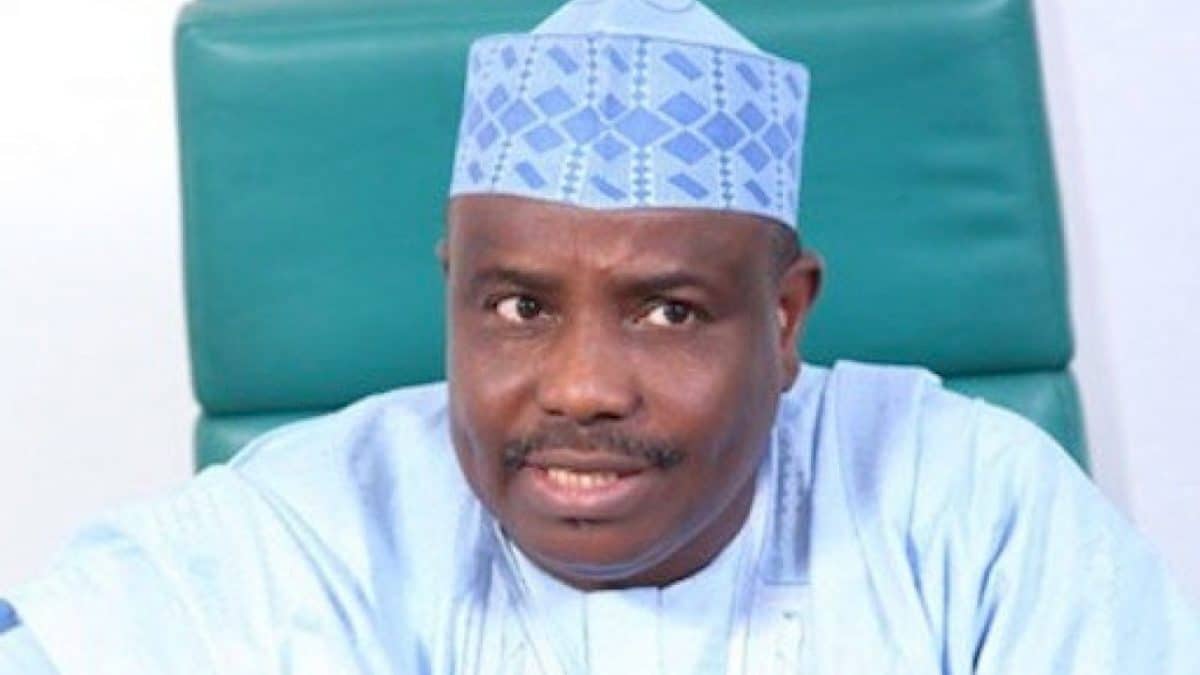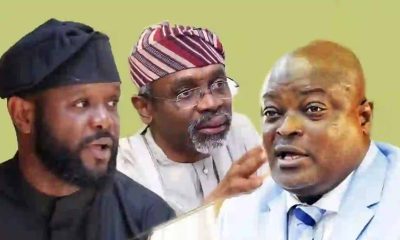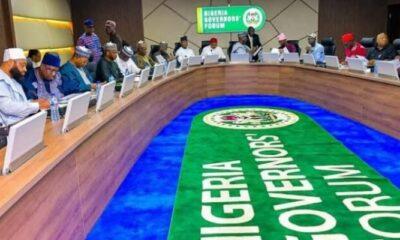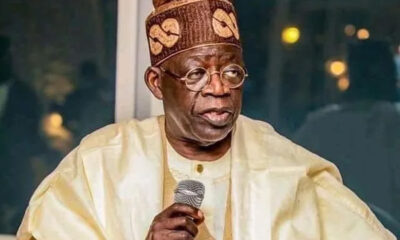Business
Recession looming over naira scarcity, state governors warn

Governors of the 36 states in Nigeria have warned of a possible recession arising from the devastating effects of the current scarcity of naira notes to the small-scale businesses and by extension the nation’s economy.
They therefore asked President Muhammadu Buhari and the Central Bank of Nigeria (CBN) to listen to the voice of reason from the nation and the international community concerning the naira issue.
The Council of State had last Friday advised the CBN to print more naira notes or release the old ones to the system to ease the sufferings of Nigerians.
This was after the governors of Kogi, Kaduna, Zamfara and Kano states had dragged the Federal Government to Supreme Court, seeking cancellation of the CBN deadline for the new naira policy which they said had caused untold hardship to their citizens.
The apex court had last week ruled in favour of the governors, ordering the suspension of the February 10 deadline.
The state governors, rising from their meeting on Saturday under the aegis of the Nigeria Governors Forum (NGF) asked the FG and CBN to reconsider their stand on the naira issue.
They expressed sympathy and support for Nigerians who they said were experiencing great difficulties under the current CBN naira redesign and cash withdrawal restrictions policy.
Chairman of the NGF and Sokoto State governor, Aminu Tambuwal, said they felt the pains of Nigerians and that they were determined to employ all legitimate channels to ease the situation.
He said, “The current approach of the CBN raises concerns about the respect for the civil liberties and rights of Nigerians as it relates to their freedom to use legitimately earned income as they so wish.
“The Forum believes that to deploy a cashless policy and deepen digital transactions, the best practice around the world is to create a suite of incentives to attract customers; rather than a draconian approach as we have witnessed in the last three months.
“The argument by the CBN for what it describes as the astronomical increase in the currency in circulation as the basis for this policy is not supported by its own data. According to the CBN, the currency in circulation increased from N1.4 trillion in 2015 to N3.23 trillion in October 2022.
“The bank appears not to have taken into consideration the increase in the size of the country’s nominal GDP over this period, the doubling of consumer prices, rising population, and the impact of the humongous Ways & Means advances to the federal government by the Central Bank of Nigeria over this period.
“In the circumstances, it is safe to draw either of two conclusions – the CBN data may be incomplete or in fact, Nigerians may have done exceptionally well in the transition to a cashless economy.
“In addition, considering the sizable informal sector in the nation, the amount of banknotes created in exchange so far by the CBN implies it vastly underestimated the economy’s actual cash needs.
“The inability to use the new notes has had far-reaching economic effects, leading to the emergence of the Naira black market, severe food inflation, variable commodities prices based on the method of exchange, and long queues as well as crowds around Automated Teller Machines (ATMs); and banking halls across the country with individuals hoping to get a fraction of their money in new notes to meet their daily livelihood; the country runs the risk of a CBN-induced recession.
“While we acknowledge the submission of the attorney-general of the federation that the federal government will comply with the ruling of the Supreme Court which calls for the halting of CBN’s plan to end the use of the old currency notes, we are yet to observe changes in the financial system.
“Consequently, we call on the federal government and the CBN to respect the Rule of Law and listen to the voice of reason expressed by Nigerians and several other stakeholders including the Council of State, before the damage to our economy becomes too great to fix by the next administration.
“Members rose from the meeting agreeing to direct their attorneys-general to review the suit at the Supreme Court with a view to consolidating the legal reliefs pursued by states.”
Business
PH refinery: 200 trucks will load petroleum products daily, says Presidency

PH refinery: 200 trucks will load petroleum products daily, says Presidency
No fewer than 200 trucks are set to load petroleum products at the government-owned Port Harcourt Refinery, the presidency has said.
A presidential spokesperson, Sunday Dare, made this known in a statement through his official X handle on Tuesday.
Newstrends had reported that the Nigerian National Petroleum Company on Tuesday announced that Port Harcourt Refinery has resumed operations and crude oil processing after years of inactivity.
READ ALSO:
- US-based Nigerians get 30-year sentence over $3.5m romance scam
- 4 Nigerians arrested in Libya for alleged drug trafficking, infection charges
- BREAKING: Port Harcourt refinery begins operation
Reacting, Dare said, “200 trucks are expected to load products daily from the refinery, Renewing the Hopes of Nigeria.”
He added that “the Port Harcourt refinery has two wings.
“The Old Refinery comes on stream today with an installed production capacity of 60, 000 barrels per day of crude oil.”
PH refinery: 200 trucks will load petroleum products daily, says Presidency
Business
Breaking: CBN increases interest rate to 27.50%

Breaking: CBN increases interest rate to 27.50%
The Central Bank of Nigeria (CBN) has raised the lending interest to 27.50 per cent from 27.25 per cent.
This latest increase in the Monetary Policy Rate came after a meeting of the Monetary Policy Committee (MPC) of the Central Bank of Nigeria (CBN) on Monday and concluded Tuesday.
The Monetary Policy Rate measures the benchmark interest rate.
The CBN Governor, Yemi Cardoso, announced this in Abuja on Tuesday after the MPC meeting, last for the year, held at the apex bank’s headquarters.
He said the MPC voted unanimously to raise the MPR by 25 basis points from 27.25% to 27.50%; and retain the Cash Reserve Ratio (CRR) at 50% for Deposit Money Banks and 16% for Merchant Banks.
The CBN governor also said the MPC retained the Liquidity Ratio (LR) at 30% and Asymmetric Corridor at +500/-100 basis points around the MPR.
Business
Nigeria’s unemployment rate dropped to 4.3% in Q2 – NBS

Nigeria’s unemployment rate dropped to 4.3% in Q2 – NBS
Nigeria’s unemployment rate stood at 4.3 per cent in the second quarter of 2024, the National Bureau of Statistics (NBS) has said in its latest report.
The report released on Monday said the unemployment rate decreased compared to the 5.3 per cent recorded in the Q1 of 2024.
The NBS defined the unemployment rate as the share of the labour force (the combination of unemployed and employed people) who are not employed but actively searching and are available for work.
“The unemployment rate for Q2 2024 was 4.3%, showing an increase of 0.1 percentage point compared to the same period last year,” the report stated.
“The unemployment rate among males was 3.4% and 5.1% among females.
“By place of residence, the unemployment rate was 5.2% in urban areas and 2.8% in rural areas. Youth unemployment rate was 6.5% in Q2 2024, showing a decrease from 8.4% in Q1 2024.”
Report also said the unemployment rate among persons with post-secondary education was 4.8 per cent; 8.5 per cent among those with upper secondary education, 5.8 per cent for those with lower secondary education, and 2.8 per cent among those with primary education in Q2 2024.
Employment rate – 76%
The report showed that the employment-to-population ratio, which measures the number of employed workers against the total working-age population, increased to 76.1 per cent in Q2 2024.
“In Q2 2024, 76.1% of Nigeria’s working-age population was employed, up from 73.1% in Q1 2024,” the report stated.
Self-employment – 85.6%
The report further showed that Nigeria’s labour market saw a notable shift as the proportion of self-employed individuals increased in Q2 2024.
It stated, “The proportion of persons in self-employment in Q2 2024 was 85.6%.”
-

 metro20 hours ago
metro20 hours agoBREAKING: Port Harcourt refinery begins operation
-

 Business3 days ago
Business3 days agoJust in: Dangote refinery reduces petrol price for marketers
-

 metro2 days ago
metro2 days ago40-foot container falls on car in Lagos
-

 Politics3 days ago
Politics3 days ago2027: Lagos Speaker, Obasa joins gov race, may battle Seyi Tinubu, others
-

 Politics2 days ago
Politics2 days agoLagos 2027: Seyi Tinubu campaign team releases his life documentary
-

 International2 days ago
International2 days agoTrump to sack 15,000 transgender officers from U.S. military: Report
-

 Entertainment2 days ago
Entertainment2 days agoPolygamy best form of marriage for Africa – Okey Bakassi
-

 Education12 hours ago
Education12 hours agoUS University opens 2025 scholarships for international students














